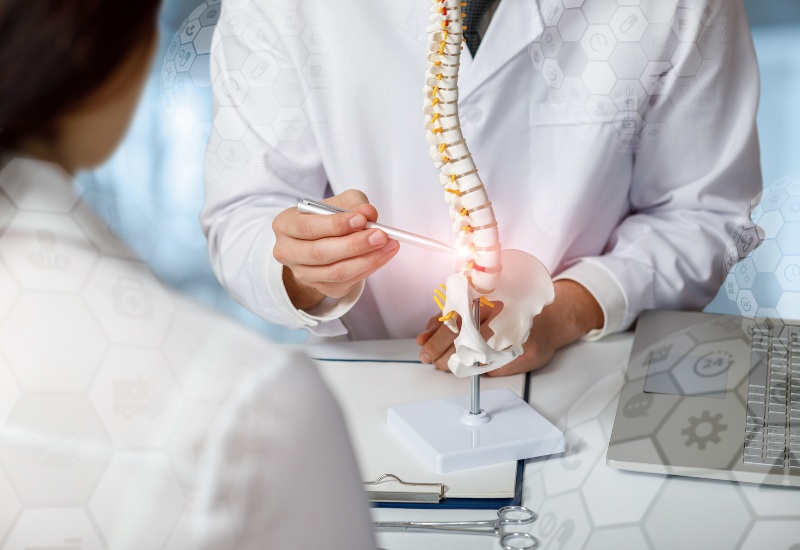Spinal Cord Compression Diagnosis and Treatment on Long Island
Expert Care for Spinal Cord Compression
If you are experiencing pain, weakness, or other signs of spinal cord compression, relief is closer than you may think. Alleviate the strain of compressed nerves in the spinal cord with Dr. Salvatore Palumbo. Discover our comprehensive approach to spinal cord compression treatment on Long Island, New York.

What Is Spinal Cord Compression?
The spinal cord is a collection of nerves, shielded by the vertebrae, that exchange sensory information between the muscles, soft tissues, and the brain. Spinal cord compression occurs when these protected nerves become squeezed or compressed. It is not a stand-alone condition but a derivative of a subsequent condition.
Causes of Spinal Cord Compression
Spinal cord compression can be caused by multiple factors. Among the most common is the gradual deterioration of the spinal bones, causing a condition called osteoarthritis. Spinal cord compression can also be associated with other conditions, including:
- Spinal misalignment (scoliosis)
- Spinal injuries
- Herniated discs
- Bone spurs
- Spinal tumors
- Various bone diseases
- Infections
- Rheumatoid arthritis
Identifying the Signs of Spinal Cord Compression
Spinal cord compression symptoms may develop rapidly or gradually worsen over time. Spinal cord compression caused by trauma or injury to the spine typically triggers instantaneous symptoms. In contrast, spinal cord compression symptoms linked to infection, tumors, or wear often develop over several weeks, months, or even years.
Spinal Cord Compression Symptoms
Spinal cord compression symptoms vary depending on the cause. Symptoms may include:
- Neck or back pain and/or stiffness
- Burning sensations in the extremities
- Numbness, weakness, or cramping in the arms, legs, or hands
- Loss of sensation in the feet
- Loss of coordination
- Weakness in the foot causing foot drop
- Sexual ability loss
- Loss of bladder/bowel control
Diagnosing Spinal Cord Compression
Diagnosing spinal cord compression begins with a comprehensive physical evaluation and assessment. Dr. Salvatore Palumbo will review your medical history, existing conditions, and symptoms, followed by a physical examination to detect signs of spinal cord compression. Advanced diagnostics may also be pursued, including:
- X-rays
- Magnetic resonance imaging (MRI)
- Computed tomography scans (CT scans)
- Electromyography
Spinal Cord Compression Treatment Options
Spinal cord compression treatment is based on the underlying cause and the patient’s symptoms. A conservative approach to spinal cord compression therapy can usually alleviate most cases. These treatments may involve anti-inflammatory medication, steroid injections, physical therapy, or radiation therapy when cancerous tumors are detected.
Surgical Interventions for Spinal Cord Compression
When conservative treatment is ineffective, or in emergency cases where the spinal cord compression has progressed to a condition known as Cauda Equina Syndrome, surgical intervention may be required. Surgical interventions may involve:
- Bone spur removal to create space between the vertebrae
- Relieve spinal pressure
- Correct vertebrae fractures
- Vertebrae fusions to stabilize the spine
How to Prevent Spinal Cord Compression
To prevent spinal cord compression, prioritize your spinal health. Effective prevention strategies include:
- Regular exercise to strengthen back muscles and encourage spine flexibility.
- Maintain proper posture.
- Upgrade to a firmer mattress.
- Be mindful of proper body mechanics when lifting heavy objects.
- Maintain a healthy weight.
- Prioritize a balanced diet.
- Refrain from smoking.
Choose Dr. Salvatore Palumbo
Choose award-winning care with Dr. Salvatore Palumbo, on Long Island, New York. Dr. Palumbo’s high-volume neurosurgical practice is renowned for advanced expertise in spinal surgery and reconstruction for degenerative and traumatic spinal disorders. With a personalized approach and state-of-the-art diagnostic equipment and surgical techniques, trust in our highly-trained experts for patient-centric care and effective results.
Reclaim Your Comfort With Spinal Cord Compression Treatment
When you detect the signs of spinal cord compression, trust your spinal health to an award-winning, board-certified neurosurgeon on Long Island, New York. Discover the path to tailored spinal cord compression treatment and sustainable relief with Dr. Salvatore Palumbo. To schedule a consultation, contact our team today.
